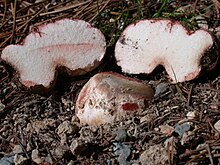Rhizopogon
| Rhizopogon | |
|---|---|
 |
|
| Rhizopogon rubescens | |
| Scientific classification | |
| Kingdom: | Fungi |
| Division: | Basidiomycota |
| Class: | Agaricomycetes |
| Order: | Boletales |
| Suborder: | Suillineae |
| Family: | Rhizopogonaceae |
| Genus: |
Rhizopogon Fr. (1817) |
| Type species | |
|
Rhizopogon luteolus Fr. & Nordholm (1817) |
|
Rhizopogon is a genus of ectomycorrhizal Basidiomycetes in the family Rhizopogonaceae. Species form hypogeous sporocarps commonly referred to as "false truffles". The general morphological characters of Rhizopogon sporocarps are a or peridium surrounding a loculate gleba that lacks a columnella. Basidiospores are produced upon basidia that are borne within the fungal hymenium that coats the interior surface of gleba locules. The peridium is often adorned with thick mycelial cords, also known as rhizomorphs, that attach the sporocarp to the surrounding substrate. The scientific name Rhizopogon is Greek for 'root' (Rhiz-) 'beard' (-pogon) and this name was given in reference to the rhizomorphs found on sporocarps of many species.
Rhizopogon species are primarily found in ectomycorrhizal association with trees in the family Pinaceae and are especially common of pine, fir, and Douglas fir trees. Through their ectomycorrhizal relationships Rhizopogon are thought to play an important role in the ecology of coniferous forests. Recent and molecular phylogenetic study has established that Rhizopogon is a member of the Boletales, closely related to Suillus.
...
Wikipedia
